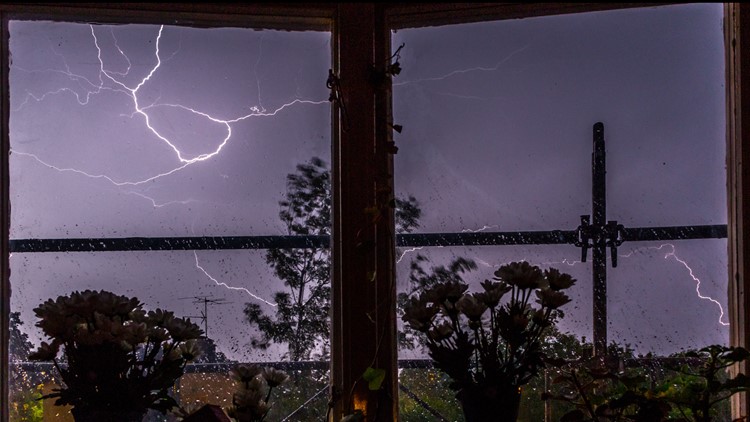ST. LOUIS — It was a pretty harrowing evening Thursday with tornadoes and tornado warnings across St. Louis.
After the sirens went off, some people went to their basements and tuned in to the various news platforms to get as much information as they could, while someone in my neighborhood started mowing their lawn.
Dr. Elana Newman, a psychologist and professor at the University of Tulsa who studies mental health related to disasters, said she’s not surprised by the different reactions.
During weather alerts its common to see two types of personalities, which she refers to as “avoiders” and “approachers.” The two types are based our tendency to either avoid or approach our fears.
“It’s important to know if you are an avoider or an approacher when you’re stressed,” she said. “To stay safe during a high-alert situation like a tornado warning, each personality may need to adjust their news consumption.”
Avoiders
During severe weather, avoiders think meteorologists are blowing things out of proportion and will be outside or continue going about their day, as if there is no imminent danger.
“Avoiders minimize and avoid their fears,” Newman said. “That could get them in trouble when it’s time to act during a real emergency.”
As a disaster researcher and responder during the deadly tornados in Joplin, Missouri in 2011 and in Moore, Oklahoma in 1999, Newman said she’s seen people say they don’t need to go into the basement, and she’s also seen people in the same areas have their entire houses blown off.
“Avoiders may have to make risk assessments for themselves in advance of the storm, which includes knowing under which conditions they would take cover or do something to protect their families,” she advised.
These are the kind of people who may need to increase their news consumption to keep themselves safe. This could be turning on their TV with the volume up, she explained.
Approachers
On the other hand, you don’t have to tell approachers to go to the basement. They know about the potential for severe weather before the sirens go off because they have been tracking the forecast all week.
“If you're someone who tends to be an approacher then you are like: 'Tell me all the information right now’,” Newman said. “This becomes a problem because they can become easily overwhelmed by consuming too much news.”
She recommends approachers stay aware of the potential for danger but dial down their news consumption to titrate their exposure.
“Approachers might need to turn down the volume on their weather radio or maybe just listen to the weather radio to check the status of the storm instead of the weather radio, the TV, and the weather App on their phone,” Newman explained.
Risk Assessment
Think about your own style when it comes to severe weather news coverage. Here are the questions you need to ask to conduct your own risk assessment.
- Do I gravitate towards information when I’m stressed?
- Do I gravitate away from information when I’m stressed?
- When you do this, how anxious does that make me feel?
- What is the amount of information that I need just be safe?
“As an example, approachers need to ask themselves 'is it doing me any good to constantly watch and check for storms?'" Newman said. “You can say to yourself, 'I'm going to check the status of the storm every 10 minutes rather than constantly being glued to several different information sources.”
Weather-Related Fear and PTSD
Newman explained the two personalities and thought it was important to distinguish between someone who is fearful of storms and someone who may have trauma.
“I often tell people that being fearful is a good thing,” Newman said. “If we were not afraid as human beings, we wouldn't be around. Fear is a signal that helps you stay alive.”
It's when fear is overwhelming, not acknowledged, or not addressed, that problems arise.
“Fear is not pleasant, and I don't wish it upon anyone,” she added. “Having a healthy fear of tornadoes keeps us safe.”
On the other hand, people who have post-traumatic stress disorder are more hypervigilant to danger cues in general.
“They become so overwhelmed that they have to really figure out how to calm themselves down and how can they address the imminent danger without becoming overwhelmed,” Newman explained.
For example, someone with PTSD, listening to a severe weather forecast for their state may believe a tornado is coming exactly where they are. While we do not know that for sure, in these times meteorologists should be our most trusted advisor.
“One thing about trauma is that it takes away all your sense of control and you feel out of control,” she explained. “The best thing you can do is to gain a sense of control by taking deep breaths and practicing emergency drills.”
Being able to practice emergency drills before the storms becomes very important for kids in particular. Kids don't always know how to be safe, so having parents talk about staying safe, model courage, and be prepared can really help them.
“Children are listening very carefully to adults, so monitoring one's own response and how fearful they are can make a difference for children,” Dr. Newman said.
Dr. Newman’s Tips for Staying Safe
Before the Storms
- Create a family safety plan that includes where to go and what do during a storm or any emergency.
- Decide on a family meeting place.
- Practice emergency drills with the entire family, including children.
- Know the difference between a tornado watch and warning.
- Know how structurally safe your living structure is.
- Know your geographical area, including counties, cities and the location of highways and rivers that meteorologists will refer to.
During the Storm
- Try to remain calm by taking deep breaths.
- Model courage and resiliency to children.
- Act on your safety plan.



